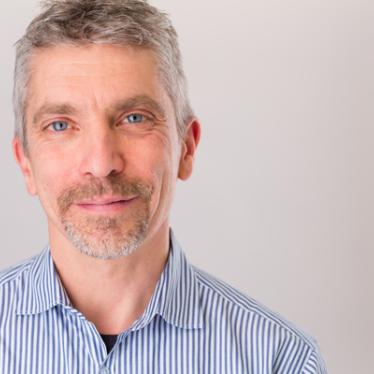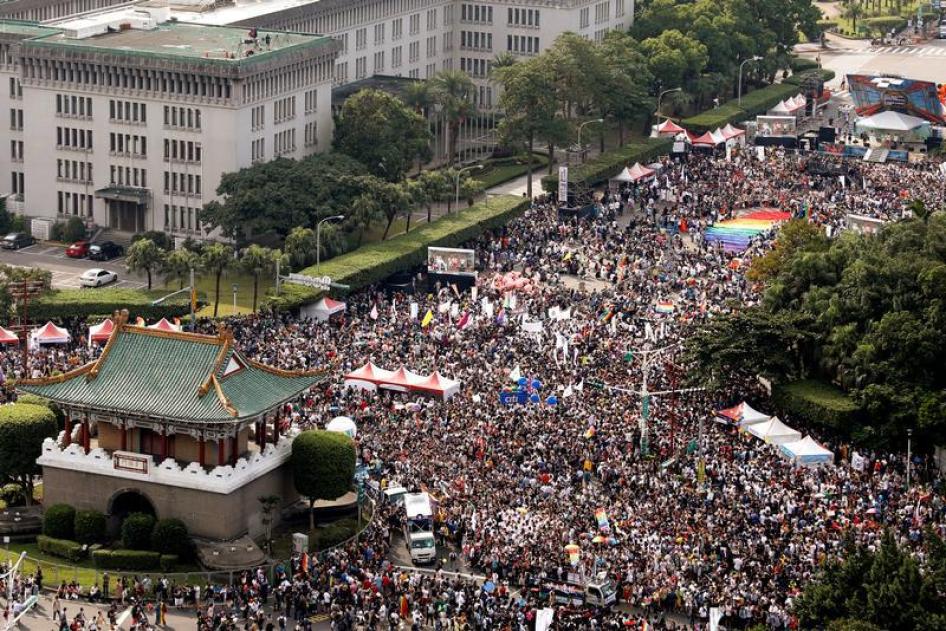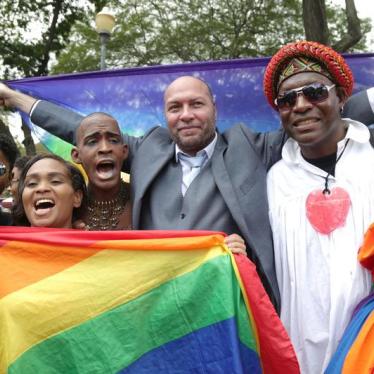In the US, 2018 heralds a bumper year for queer culture: while award-winning Call Me By Your Name is enjoying widespread public accolade and generous critical acclaim, classics including Torch Song Trilogy, The Boys in the Band and Angels in America are lined up on Broadway. Queer Eye and RuPaul’s Drag Race garner attention on the small screen.
Yet this cultural revival takes place against a backdrop of uncertainty in the US with a rollback of rights for LGBT people domestically, and a wavering of support internationally. This tension played itself out in a highly publicized frosty standoff between Vice-President Mike Pence and the ice skater Adam Rippon during the winter Olympics in Seoul. “You mean Mike Pence, the same Mike Pence that funded gay conversion therapy? I’m not buying it,” Rippon said in response to a reported overture for a meeting.
The US government withdrew protection for transgender students under Title IX in February, and in October issued a directive stating that transgender people are not protected from employment discrimination under Title VII, reversing a 2014 Justice Department position. In two separate cases, the Justice Department filed amicus briefs in efforts to curtail LGBT protections against workplace and public accommodations.
President Donald Trump issued a memorandum barring transgender people from serving in the military, although this has been blocked by courts and contradicted in practice. An executive order opened the way for religious exemptions, and poses a threat to the rights of women and LGBT people.
Looking back over a tumultuous year, for lesbian, gay, bisexual and transgender (LGBT) people in many parts of the world, 2017 was grim by any standard. The most disturbing trend was the scale and frequency of arbitrary arrests, state-sponsored discrimination, and violence against LGBT people. The brutal consequence of intensified homophobia orchestrated or facilitated by agents of the state was evident in Azerbaijan, Russia’s Chechen Republic (Chechnya), Egypt, Indonesia, Tajikistan, and Tanzania. For activists, it was a year of responding to a seemingly endless cycle of unfolding crises.
And yet, looking beyond these egregious abuses, there was also remarkable progress. Positive court rulings in several jurisdictions enhanced protections for LGBT people, while several countries gave legal recognition to same-sex relationships and transgender identities. The United Nations General Assembly received its first report on violence and discrimination against LGBT people.
No doubt, as the visibility of LGBT people grows, and rights are achieved in some parts of the world, there has been a strong response from groups that stand against LGBT rights and that are better organized, funded and more sophisticated than in the past. There has also been a spike in political homophobia, as unpopular minorities bear the brunt of majoritarian rhetoric and authoritarian rule.
State-sponsored homophobia
Political homophobia remains a potent symbol for autocratic leaders and a convenient football for competing ideologies. It is also a dangerous precursor to discrimination and violence against LGBT people.
Since 2013, the Egyptian government of President Abdel Fattah al-Sisi has systematically arrested gay and bisexual men and transgender women, with several hundred imprisoned for same-sex conduct. In September 2017, the police conducted a new wave of arrests after revelers at the acclaimed Mashrou’ Leila concert displayed a rainbow flag. The US withheld a proportion of military aid to Egypt, due to stated concerns about human rights abuses, specifically a law that places onerous restrictions on nongovernmental organizations. Yet, by and large, Egypt’s allies focused on investment, migration, and counterterrorism, and ignored Egypt’s abysmal human rights record.
During the year, Indonesian authorities conducted raids against LGBT people, exploiting an existing anti-pornography law to apprehend at least 200, and bring charges against gay men arrested in a hotel, as well as night clubs and saunas. Transgender women found themselves hounded by vigilantes. Despite an international outcry, two men convicted of having consensual sex in Aceh were subjected to 85 lashes with a cane in public under Sharia (Islamic law) applicable in that region.
Nonetheless, Indonesia accepted two recommendations during its Universal Periodic Review (UPR) before the UN Human Rights Council pertaining to LGBT people: one on the protection of LGBT human rights defenders, and another on prioritizing equality and nondiscrimination, including in relation to LGBT people.
In April, news broke of a wide-scale purge against gay and bisexual men in Chechnya. Security and police officials rounded up presumably gay men and tortured them in informal detention facilities. The authorities mined the men’s social media accounts and contacts for the names of other men, who were also rounded up. Detainees were released to elder male relatives in public rituals of humiliation, and their captors encouraged families to commit so-called “honor killings.”
Sustained international pressure compelled the Kremlin to press Chechen authorities to suspend the purge and to open a federal inquest.
The investigation has made little progress, but the crimes have not gone unheeded. The United States has sanctioned the Chechen leader, Ramzan Kadyrov, and another Chechen official.
At least 79 survivors or people otherwise affected by the purge fled Chechnya with the assistance of Russia’s leading LGBT support group and were eventually resettled in Canada and several European Union countries.
In Africa, The Tanzanian government closed down drop-in centers providing HIV services for key populations, contending that the centers “promote homosexuality.” When activists and lawyers held a meeting in October to discuss a legal challenge to policies that limit the right to health, police arrested and detained them without charge.
Dating apps have provided an indispensable means for LGBT people to connect, form community, and find avenues for dating and sex. But when infiltrated, they are also effective tools for blackmailers and extortionists, and for authorities to pursue LGBT people. In South Korea, for example, where homosexual conduct is not permitted in the military, army investigators seized suspected gay soldiers’ smart phones and scanned dating apps to entrap gay soldiers.
Of course, governments are not the only sources of violence against LGBT people. Annual survey results in Britain and France revealed significant increases in bias-motivated attacks against people based on sexual orientation or gender identity. Men across the Netherlands took to holding hands in public in a demonstration of solidarity with a gay couple who were victims of a violent assault.
In the US, 26 transgender people murdered in what appear to be hate crimes were commemorated on November 20, Transgender Remembrance Day.
The Obama administration explicitly included sexual orientation and gender identity as elements of a broader human rights agenda guiding foreign policy. Vocal political support from governments, including the United States, has helped LGBT groups internationally and is part of the reason why organizations have been more visible and vocal. If that support wanes, LGBT groups will be more vulnerable and exposed. It will also send a signal that these human rights issues are not being taken seriously, paving the way for increased discrimination and violence against LGBT people.
Freedom of Expression, Association and Assembly
For LGBT people around the world, invisibility has been a double-edged sword. The closet provides a measure of protection from social condemnation, legal prohibition - or worse - violent attack. But the price is high – it means hiding fundamental aspects of the self, which takes its toll, both personally and socially. The ability to form community, to associate, organize and assemble are of great importance to LGBT groups around the world and yet these fundamental rights are often denied.
The African Commission on Human and Peoples’ Rights has increasingly championed the rights of LGBT people and those who defend them. At its 60th ordinary session in May, the commission emphasized the need to protect all human rights defenders, including those working for the protection of LGBT rights, and to ensure freedom of assembly rights for LGBT groups.
Despite these directives, Tanzania repeatedly threatened LGBT human rights defenders, along with other groups working on controversial issues, and raided meetings and workshops. Ugandan police raided and shut down the Queer Kampala International Film Festival, as well as a week of scheduled activities for annual Pride Week, while an Egyptian media regulatory body declared a media blackout on positive reporting on homosexuality.
In Turkey, the governor of Ankara imposed an indefinite ban on all public LGBT events in the province. In contrast, Bulgarian police stepped in to protect Sofia Pride from threatened disruptions by an ultra-nationalist, virulently homophobic group. Businesses in Singapore stepped up to the podium to support the annual Pink Dot festival after the government forbade sponsorship by multinational corporations.
Meanwhile, there were some positive developments, as courts in South Korea and Mozambique stepped in to facilitate the registration of LGBT groups.
Abuses in Medical Settings
Paradoxically, because ideas about sexuality and gender identity are deeply embedded in medical science, the helping professions can be a source of trauma and abuse for LGBT people.
In China, a court ruled against a public hospital that had forced a gay man into so-called conversion therapy, which is widespread in both state and private medical settings, although homosexuality is not officially regarded as a mental disorder. In contrast, in Brazil, a judge overruled a long- standing decision by the Federal Council of Psychology to ban licensed psychologists from engaging in sexual orientation change efforts.
National and international medical authorities have been at the forefront of calls to ban forced anal examinations to determine if individuals have engaged in anal sex. The examinations have no forensic value or medical basis, and can amount to a form of torture or sexual assault, yet are still practiced in several countries.
In the US, a legal settlement was reached in a case brought by adoptive parents involving medically unnecessary cosmetic surgery on an intersex infant. The settlement augured well for intersex activists in the US who have been campaigning against such surgery for decades to little avail. The American Medical Association board of trustees, two pediatrics organizations, and three former US Surgeons General called for an end to medically unnecessary surgeries on intersex children.
School environment and sex education
Schools can be hostile environments for LGBT youth who struggle with rejection and an absence of positive affirmation at a time when they are most vulnerable.
Japan revised its national bullying prevention policy to explicitly include LGBT students, but failed to update its national educational curriculum, which still ignores LGBT issues. Meanwhile the Philippines issued a gender inclusive policy in schools that offers express protection on grounds of sexual orientation and gender identity, but effective implementation is lacking.
Legal and policy developments
In a political environment in which the rights of LGBT people remain an unpopular cause, courts can play a positive role in affirming fundamental rights. But courts can also be an instrument of repression.
In a strongly worded judgment that could have broad impact, a US district court ruled in a case brought against the anti-gay Christian evangelist Scott Lively for fomenting homophobia in Uganda. While the lawsuit was rejected on jurisdictional grounds, the judge minced no words in denouncing Lively’s “crackpot bigotry” that aided “a vicious and frightening campaign of repression against LGBTI people in Uganda.”
Indonesia’s Constitutional Court deliberated on, but rejected on procedural grounds, a proposal to criminalize all sex outside of marriage, including same-sex conduct.
The European Court of Human Rights condemned Russia’s “gay propaganda” law in a decision that Russia is obligated to abide by, even though three months after the ruling a Russian court found an activist, Evdokia Romanova, guilty under the same law. In the US, Utah repealed its “no promo homo” law, which curtailed discussions of homosexuality in schools, but seven other US states retain similar laws.
In India, hope was rekindled by a Supreme Court judgment that ruled privacy a fundamental right and made express reference to section 377 of the penal code, a vestige of colonial rule that outlaws same-sex conduct. A writ petition filed against a 2013 judgment that upheld the constitutionality of the sodomy law will be heard by the Supreme Court this year.
While activists in India protested the shortcomings in a proposed law seeking to protect the rights of transgender people , Nepal took concrete steps towards a trans-inclusive civil service. Despite a surge in violent attacks on transgender women in Pakistan, activists there have pushed legal recognition and social services inclusion with human rights bodies and regional and national legislatures.
Ukraine took significant steps toward a less cumbersome and abusive legal gender-recognition procedure, and in a groundbreaking Botswanan case, a transgender man won a seven-year battle for legal gender recognition. In the US, discriminatory bills that sought to restrict access to facilities for transgender students were withdrawn in South Dakota and died without coming to a vote in Texas.
Despite efforts by anti-gay marriage activists, Finland, Germany, Malta and Australia embraced marriage equality, while constitutional courts in Taiwan and Austria ruled that current laws defining marriage as “between a man and a woman” were unconstitutional, instructing parliament to revise the law within a set timeframe.
The news from the British overseas territory Bermuda was less positive. The legislature passed a bill that replaced marriage with domestic partnerships for same-sex couples, undoing a previous Supreme Court ruling on equal marriage; the governor has not yet assented to the bill.
Legislatures in the US states of South Dakota, Alabama and Texas curtailed adoption rights for same-sex couples. The Israeli government initially opposed, then accepted joint parent adoption for same-sex couples.
Moving Forward in Perilous Times
For those who have been at the receiving end of state-sponsored crackdowns, there is cold comfort in seeing the stories of global progress that are incremental but significant. When Canadian Prime Minister Justin Trudeau, in an emotional address to a cheering parliament, apologized for past injury to gender and sexual minorities , he sent a signal to the world that exclusion is not necessarily a permanent state of being and that governments can make amends for past discriminatory policies.
In a significant milestone, a group of experts issued the updated Yogyakarta + 10 principles, which provide guidelines for the interpretation and application of international human rights law regarding sexual orientation and gender identity. The principles will provide guidance for governments that are willing to reconsider their stance on LGBT rights. The 2016 launch of the Equal Rights Coalition, the first intergovernmental network to advance the rights of LGBT people, signifies a growing willingness of almost 40 member states to play a more proactive international role.
The UN’s first independent expert on violence and discrimination based on sexual orientation and gender identity, Vitit Muntarbhorn, presented a report to the UN General Assembly in September that outlined his vision of the steps that need to be taken to combat violence and discrimination: decriminalization of same-sex relations; effective anti-discrimination measures; legal recognition of gender identity; de-stigmatization; sociocultural inclusion; and promotion of education and empathy.
This is a road map that activists around the world can rally around. But the best approach to defending and advancing rights is not through a blueprint but by tailoring strategy to context. In the US, activists would do well to defend ground at risk by sweeping religious exemptions, and holding the government to account for its human rights record internationally. In regions of the world experiencing violent crackdowns, the activists focus on security, and evading the dragnet. In some countries, such as Indonesia, the immediate goal is to prevent sweeping discriminatory laws being passed. It is in middle-ground countries – those that are neither fully accepting, nor overtly hostile - where the most promising developments are taking place, and where courts are playing a crucial role in defending and advancing the rights of LGBT people.











